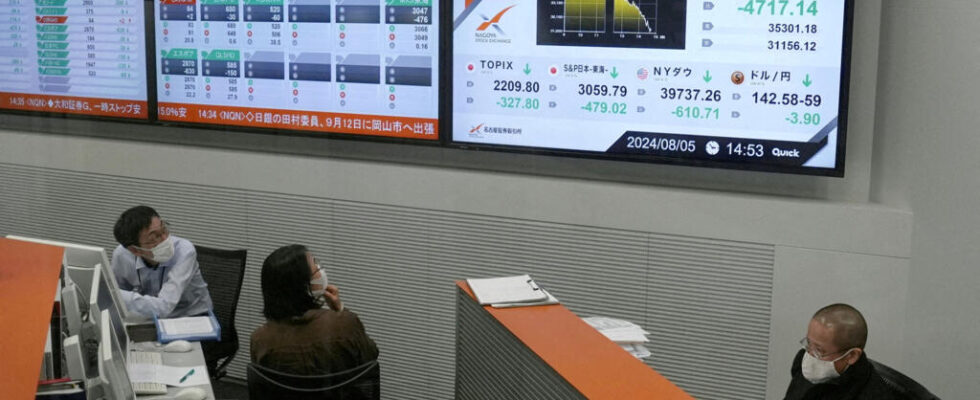The Tokyo Stock Exchange closed on Tuesday, August 6, with a rebound of 10.2% after having fallen by 12.4% the day before, the biggest drop in points in its history. The trigger for this violent correction was the first signs of a slowdown in the American economy and the sudden rise of the yen under the effect of the unwinding of a speculative movement called a “carry trade” on the Japanese currency.
2 min
With our correspondent in Tokyo, Frederic Charles
Analysts at Tokyo consider this overreaction of the Sotck exchange Japanese but fear that it will discourage the Japanese from putting part of their savings back into the Japanese stock market. In about twenty minutes this Monday, the Tokyo Stock Exchange experienced a “black Monday”, its worst session (-12%) since the crash of 1987.
In July, the Tokyo Stock Exchange reached its highest level in history at 42,000 points. Japanese companies posted record profits for the third consecutive year. It had taken 34 years after the bursting of the financial and real estate bubbles to return to and surpass its 1989 peak.
The Tokyo Stock Exchange was hit by rising interest rates in Japan after years of negative rates, according to Asian equity research analysts at Smarkarma. That hastened the yen’s rally.
The move is bad for Japan’s big exporters, which have benefited from the currency’s fall. Some analysts in Tokyo wonder whether Japanese households that opened tax-exempt savings accounts called “NISAs” and invested some of their savings in Japanese and U.S. stocks will turn away from the stock market again. Only 12 percent of Japanese household savings are invested in the stock market.
There Tokyo Stock Exchange should overcome the biggest fall in its history. The profitability of Japanese companies is improving. The latter dominates, like Advantest, the technologies of testing for electronic components. The large groups agree to sell unprofitable activities, observes Edward Bourlet, an analyst of the bank CLSA in Tokyo. There is an increase in mergers and acquisitions operations.
Japan is also benefiting from the tensions between the United States and China. Major investment banks are relocating funds to Japan, as are Chinese investors.
Unexpected rebound in Asia
After the fall, the rebound: Asian stock markets are recovering after a black Monday yesterday. After plunging 12%, Tokyo is experiencing a spectacular rebound. Fueled by fears of a recession in the United States, stock markets around the world followed. This recovery gives hope that Monday’s crash is only temporary. Japan’s variations give the most hope. The flagship index of the Tokyo stock exchange, the Nikkei, has already recovered 10%. All Asian markets have followed the Japanese movement. Taiwan, which was badly affected on Monday, is stabilizing and South Korea is climbing without, however, returning to its pre-fall levels.
In Europe, the main stock markets, which had lost an average of 2% of their value, are rising at the opening. In Frankfurt, Paris and London, all the indices are in the green. This unexpected rebound confirms the hypothesis of a panic movement, as economist Nicolas Véron explains. Investors have overreacted, seized with fear at the idea of an American recession.
All eyes are now on the United States. On Wall Street, it was mainly technology stocks that took a nosedive on Monday. The NASDAQ, the sector index, lost 3.5%. This slide had started last week. It remains to be seen whether Japanese optimism can stop its fall.
Read alsoWhy global markets are crashing
